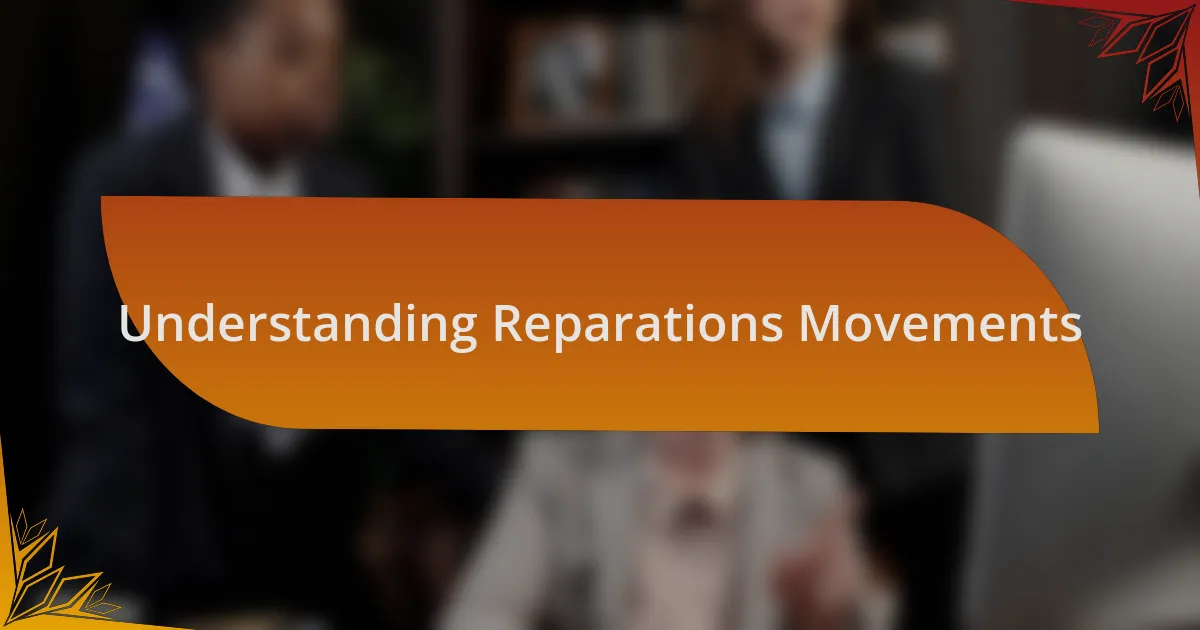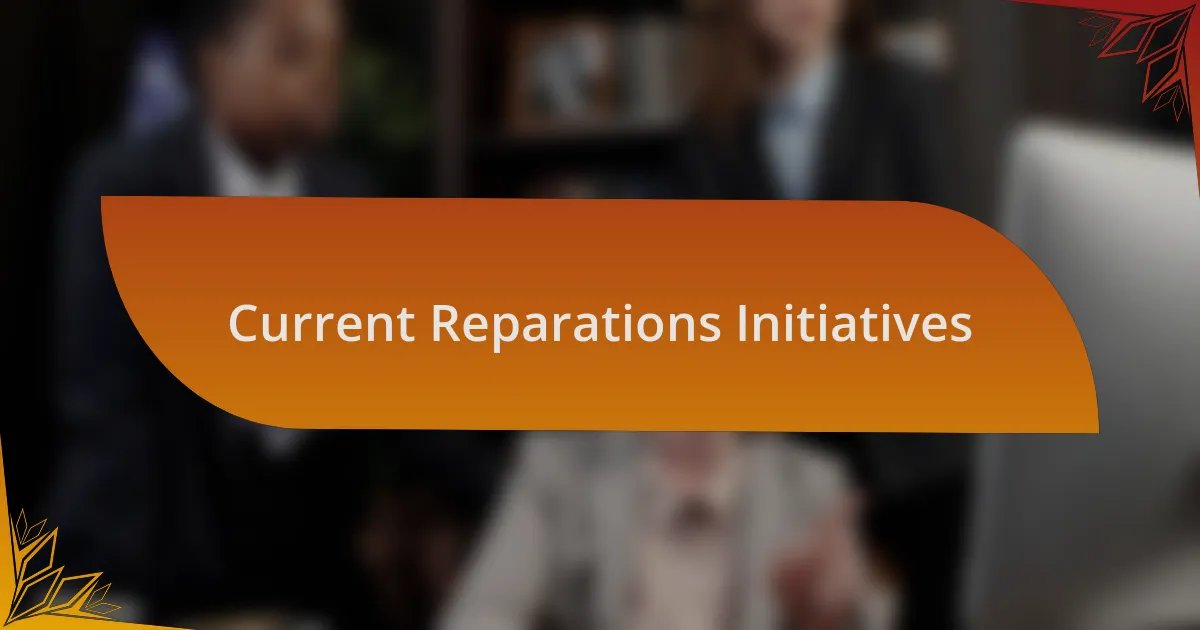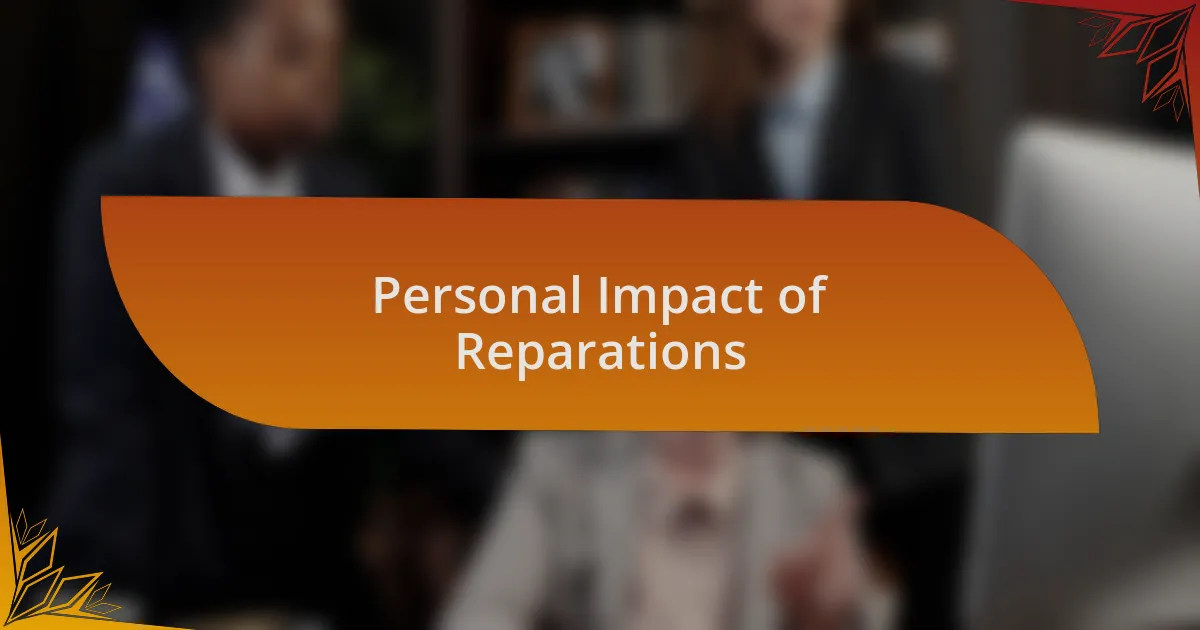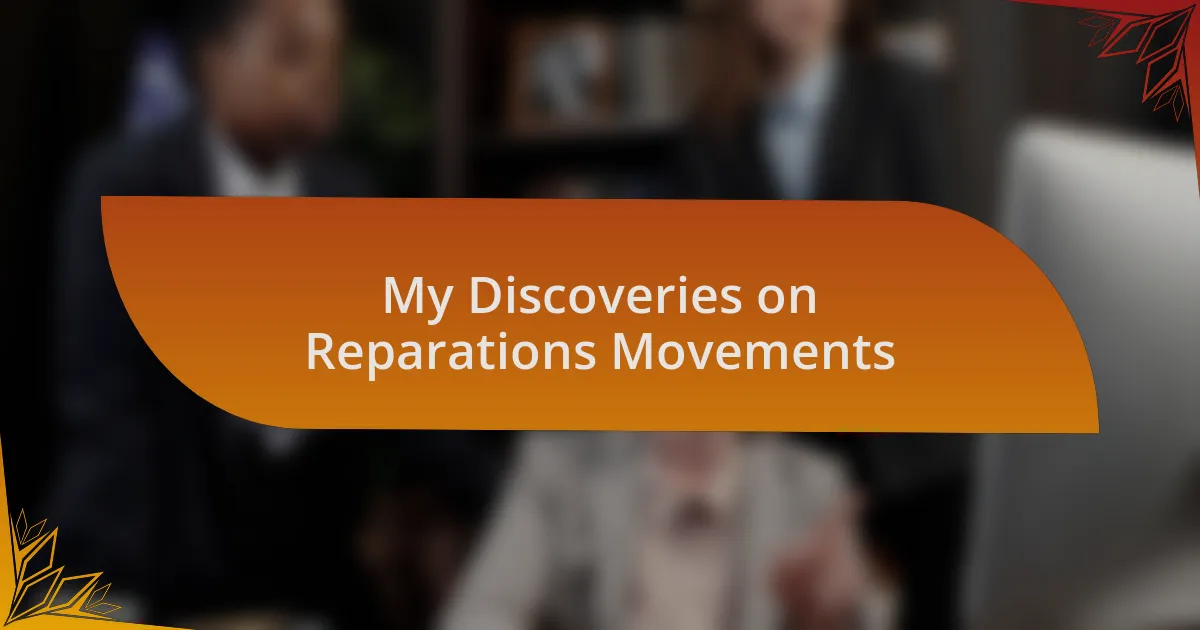Key takeaways:
- Reparations politics aim to address historical injustices faced by marginalized communities, particularly African Americans, and are seen as vital for healing and social justice.
- Arguments for reparations focus on justice, acknowledgment of pain, and the need for systemic change to rectify long-standing economic disparities.
- Current initiatives, such as those in San Francisco and California, seek to provide financial restitution and community investment, highlighting the diverse approaches to reparative justice.
- Personal stories and community dialogues emphasize the emotional impact of reparations, suggesting that these movements can foster healing and restore dignity to affected individuals and communities.

Reparations Politics Overview
Reparations politics encompasses the various movements and policies aimed at acknowledging and addressing the injustices faced by marginalized communities, particularly African Americans due to slavery and systemic racism. I remember feeling a distinct sense of urgency when I first engaged with this topic; it was clear to me that reparations were not just economic payments but a gesture toward healing historical wounds that continue to affect lives today. Isn’t it intriguing how these discussions often reveal the depths of societal inequalities?
The conversation around reparations is multifaceted, involving moral, financial, and social dimensions. From my perspective, the emotional weight of this debate can be overwhelming—many argue that a mere apology is insufficient, while others believe financial compensation could never truly erase the past. I often wonder, can any amount of reparative justice truly compensate for generations of trauma?
Moreover, the landscape of reparations politics is constantly evolving, with legislative proposals and grassroots movements sparking dialogue across the nation. It fascinates me how different communities are approaching this issue—from local initiatives calling for reparations to national debates within Congress. Have you noticed how these movements sometimes evoke strong reactions, whether in support or opposition? It’s clear that reparations are not just a political issue; they’re a profound reflection of our societal values and collective conscience.

Understanding Reparations Movements
Understanding reparations movements requires a deep dive into both the historical context and the evolving societal attitudes toward inequality. Reflecting on my own experiences, I remember attending a community forum where passionate advocates shared stories of their families’ struggles stemming from systemic oppression. Those moments clarified for me that reparations are not simply about monetary compensation; they are about recognizing and honoring the pain of past injustices.
The complexity of reparations often gets lost in political rhetoric. Personally, I find it astonishing how some dismiss the conversation without considering the long-term impacts of slavery and discrimination on present-day wealth disparities. Could it be that real progress demands a willingness to confront uncomfortable truths? Engaging in this dialogue often challenges me to rethink my own beliefs and biases.
As I observe various movements advocating for reparations, I am struck by the diversity of approaches being taken. Each initiative seems to carry its own urgency and rationale, shaped by local histories and community needs. It makes me wonder how we can find common ground amidst such varied perspectives. After all, the goal isn’t just about financial restitution; it’s about fostering understanding and paving the way for a more equitable future.

Historical Context of Reparations
The historical roots of reparations can be traced back to the aftermath of slavery in the United States. I recall learning about the promise of “40 acres and a mule” following the Civil War, a commitment that was never fulfilled. This unkept promise highlights how historical injustices were often glossed over, leaving communities grappling with the long-term effects of economic disadvantage.
In my research, I’ve come across various other global movements for reparations, like those in South Africa following apartheid. It’s fascinating to see how different countries confront their histories of oppression. The emotional toll of these injustices often resonates deeply within communities, prompting questions: How can we heal a society when the wounds of the past remain open?
Reflecting on the various international examples, I realize that reparations are more than just financial compensation; they serve a vital role in acknowledging historical harm. When we think about the injustices faced by Indigenous peoples or those impacted by colonial exploitation, I ask myself: Is it enough to simply apologize, or do we need to take tangible steps to address these wrongs? Each of these discussions pushes me to think critically about how societies can truly honor their past while striving for a more equitable future.

Key Arguments for Reparations
Arguments for reparations center on the principle of justice. When I think about the economic disparities that persist today, they often stem from historical injustices. I’ve seen firsthand how generational wealth is often tied to land and resources that were denied to marginalized communities. Isn’t it reasonable to argue that those who benefited from such systems should contribute to rectifying these deep-seated inequalities?
Another compelling reason for reparations is the concept of acknowledgment and validation. I once spoke with a friend from an African American background who shared their family’s struggles, rooted in systemic oppression. It struck me how much healing could come from an official recognition of these injustices. By addressing the pain of the past, reparations can help to foster a more inclusive national narrative—one that validates the experiences of marginalized communities.
Lastly, reparations are a pathway toward social change. I remember attending a community forum where local leaders discussed the need for reparations as a starting point for broader reforms. This emphasis on restitution is not merely about financial compensation; it’s about paving the way for systemic changes that ensure equal opportunities for all. How can we expect progress without confronting our history honestly? Engaging in these reparations discussions encourages a transformative potential that could reshape our society for the better.

Current Reparations Initiatives
Current reparations initiatives are gaining momentum across various communities and levels of government. For instance, in San Francisco, a task force was established to outline a reparations plan that includes significant financial payments to eligible Black residents. As I’ve followed this development, I’ve felt a mix of hope and skepticism; can a city truly address centuries of injustice with monetary compensation alone?
In a different vein, the state of California has introduced measures to establish reparations for descendants of enslaved individuals. This initiative aims not only for financial restitution but also for investments in education, housing, and economic development within affected communities. I can’t help but wonder what lasting impact such initiatives could have on breaking the cycles of poverty and disenfranchisement that I’ve seen affect so many families around me.
On a more grassroots level, organizations across the nation are pushing for reparations in various forms, including land trusts and community investment funds. I attended a local meeting where activists passionately argued for land restitution to Indigenous peoples, further highlighting that reparative justice isn’t one-size-fits-all. These conversations often evoke a powerful emotional response. How can we truly create equity without addressing the historical wrongs first? The pursuit of reparations is, at its core, a journey toward mutual understanding and healing.

Personal Impact of Reparations
The personal impact of reparations is profound and multifaceted. I remember speaking with a friend whose family has faced generational trauma due to systemic racism. When we discussed the potential for reparations, I could see a glimmer of hope in their eyes—a sense that finally, their pain might be acknowledged in a tangible way. What does it feel like to have your suffering recognized after so many years? For some, it offers the possibility of healing.
Having witnessed discussions around reparations, I often feel an emotional weight in the room. There’s a raw honesty when people share their experiences with economic and social injustice, with reparations representing an opportunity for real change. During one community forum, a woman shared her family’s history and how economic disparities have led to a cycle of hardship. It hit me hard—how many stories like hers remain unheard? These narratives underscore the need for meaningful reparative actions that go beyond financial assistance.
I’ve observed that the notion of reparations doesn’t just lead to potential financial benefits. It fosters a deeper conversation about accountability and social justice. I recall a moment at a workshop where participants voiced their long-held beliefs about fairness and equity. The discussions sparked a realization in me: reparations could be about restoring dignity as much as material support. Isn’t it time we move toward a future where all communities feel valued and heard?

My Discoveries on Reparations Movements
As I delved deeper into reparations movements, I discovered that these initiatives often serve as catalysts for broader discussions on justice and equity. In a conversation with a local activist, I was struck by their passionate belief that reparations are not merely financial transactions but a way to restore the humanity of marginalized communities. It made me wonder—what does community healing truly look like?
I also came across stories revealing how reparations can help communities reclaim their narratives. At a recent panel discussion, a historian shared how acknowledging past injustices can empower future generations. This got me thinking about the importance of storytelling in the reparations movement; if we don’t tell these stories, how can we expect to see the necessary change?
On a personal level, I felt a profound connection when I participated in a workshop focused on reparative justice. Hearing individuals articulate their visions of what reparations could achieve made me realize that these movements might be the key to bridging divisions in our society. I left with a question lingering in my mind: how can each of us contribute to this essential dialogue for the sake of progress?